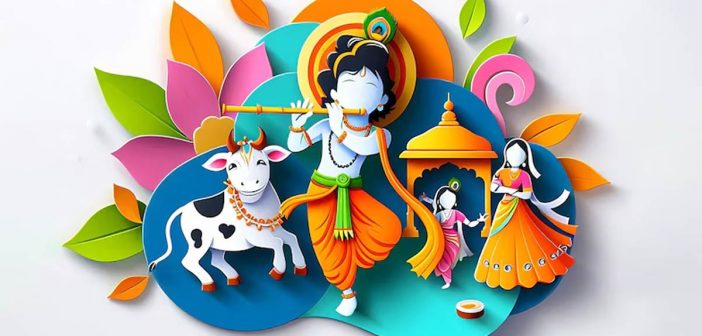Janmashtami, a vibrant and spiritually significant festival, marks the birth of Lord Krishna, one of the most revered deities in Hinduism. Celebrated with fervor and devotion across India and by Hindus worldwide, Janmashtami is more than a religious event; it is a celebration of life, love, and the eternal battle between good and evil. This year, Janmashtami falls on August 26, 2024.
Historical Origins and Mythological Background
The origins of Janmashtami are deeply rooted in Hindu mythology and scriptures such as the Mahabharata and the Bhagavad Gita. Lord Krishna was born in Mathura to Devaki and Vasudeva during the Dwapara Yuga, under dire circumstances. His birth was prophesied to end the tyranny of his maternal uncle, King Kansa, who imprisoned Devaki and Vasudeva due to a prophecy that their eighth child would be his demise. Despite Kansa’s efforts to prevent this, divine intervention facilitated Krishna’s birth and subsequent escape to Gokul, where he was raised by his foster parents, Nanda and Yashoda.
Significance of Janmashtami
Janmashtami holds immense significance in Hinduism, symbolizing the victory of good over evil and the restoration of dharma (righteousness). Lord Krishna is revered as the eighth avatar of Vishnu, who descended to earth to eradicate sin and promote dharma. His teachings, encapsulated in the Bhagavad Gita, emphasize the importance of duty, righteousness, and devotion. Celebrating Janmashtami is a way for devotees to connect with these teachings and seek Krishna’s blessings for wisdom and guidance.
Beliefs Associated with Janmashtami
Devotees believe that Krishna’s life and miracles are a divine play, known as ‘leela’, showcasing his supreme power and compassion. The stories of Krishna’s childhood, such as his playful antics of stealing butter and his dance with the gopis (milkmaids), illustrate his accessible and relatable nature. His divine love story with Radha also represents the soul’s deep yearning for union with the divine.
Celebrations and Rituals
Janmashtami is celebrated with a range of rituals that vary by region. The day often begins with fasting and prayer. Devotees refrain from consuming grains and observe a strict fast until midnight, the supposed hour of Krishna’s birth. Temples and homes are decorated with flowers, lights, and scenes from Krishna’s life. The birth of Krishna is celebrated with joyous chants of “Hare Krishna” and “Jai Shri Krishna,” accompanied by the blowing of conch shells and the ringing of bells.
Key rituals include:
- Midnight Celebrations: At midnight, the moment believed to be Krishna’s birth, idols of baby Krishna are placed in cradles, symbolizing his birth. Devotees gather to sing hymns, offer prayers, and perform aarti, a ritual of waving lighted wicks before the deity.
- Jhulan Seva: Devotees place baby Krishna’s idol on a swing and gently swing it, celebrating his infancy.
- Dahi Handi: Particularly popular in Maharashtra, this event involves teams of young men forming human pyramids to break a pot filled with curd, butter, and other dairy products. This playful act recreates Krishna’s love for butter and symbolizes his mischievous nature.
- Rasa Lila: In places like Vrindavan and Mathura, dramatic reenactments of Krishna’s life, known as Rasa Lila, are performed. These performances are vibrant and often accompanied by singing and dancing, depicting the various episodes of Krishna’s life, especially his playful times with the gopis.
Ways to Celebrate Janmashtami
- Fasting and Feasting: Devotees can fast all day, breaking it at midnight with prasadam (sacred food offerings) like butter, milk, fruits, and sweets such as laddoos and kheer, celebrating Krishna’s fondness for dairy products.
- Community Participation: Organize or participate in community events such as kirtans (devotional singing), bhajans (devotional songs), and Rasa Lila performances. Engage in group prayers and listen to stories about Krishna’s life.
- Decorations: Adorn homes and temples with flowers, lights, and diyas. Create beautiful rangolis (colorful floor patterns) and set up jhankis (dioramas) that depict scenes from Krishna’s life.
- Charity and Acts of Kindness: Following Krishna’s teachings of compassion, devotees are encouraged to engage in charitable acts, such as feeding the needy or donating to worthy causes.
Conclusion
Janmashtami is a time to reflect on the values of righteousness, devotion, and the joy of divine love. Through its vibrant celebrations and deep spiritual significance, Janmashtami not only honors the birth of Lord Krishna but also inspires millions to strive for a life filled with compassion, devotion, and dharma. As devotees celebrate this festival, they remember Krishna’s timeless message and the profound impact of his presence on Earth.





